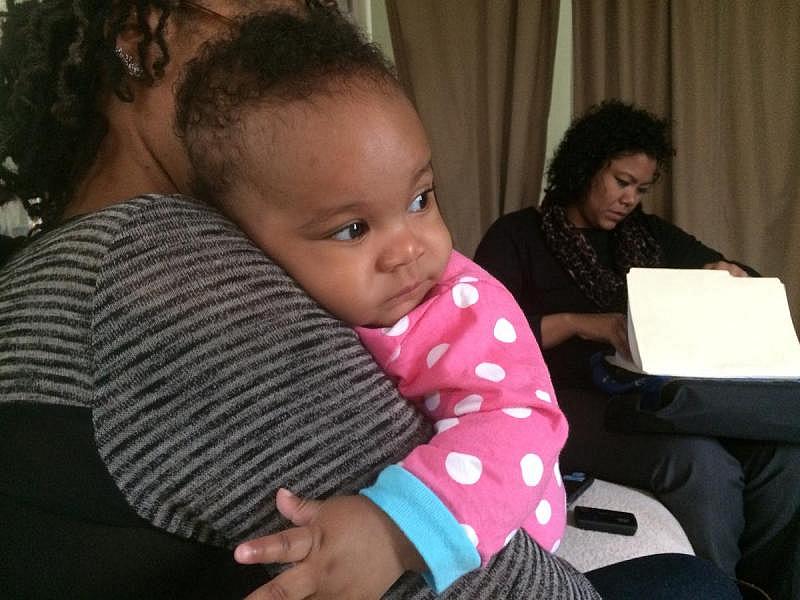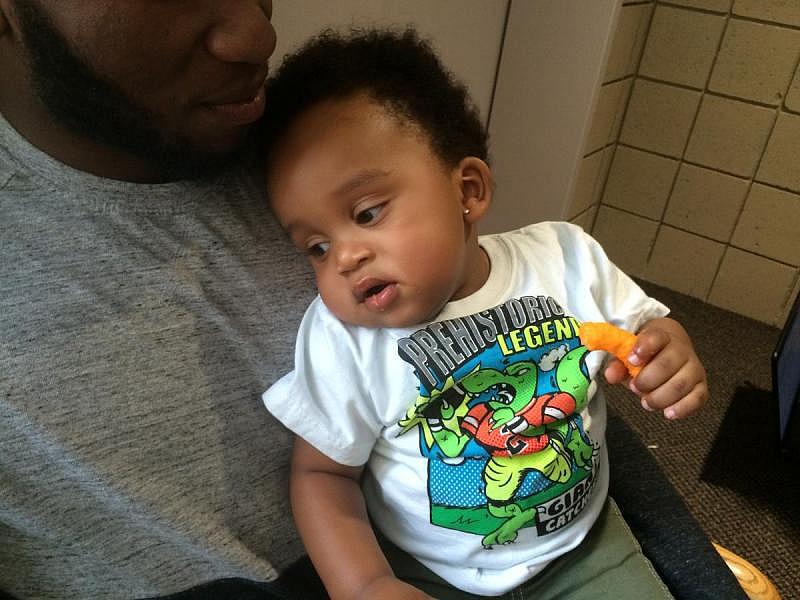Children In Crisis: Home visiting aims to prevent child abuse and neglect
Kristin Gourlay covers health care for Rhode Island Public Radio, Rhode Island's NPR station. Her series “Children in Crisis” examines the problems at Rhode Island's child welfare agency, attempts to fix them, and the impacts on children, families, and caseworkers. From the difficulties of providing quality health care to foster children to the lack of foster families willing to take in teenagers, Gourlay finds a system – and the children it’s charged with protecting – in crisis.
Other stories in the series include:

For the past week, we’ve been focusing on "Children in Crisis," our series about Rhode Island’s Department of Children, Youth, and Families. The agency is struggling to cope with an influx of neglect and abuse cases and has run into financial trouble. Now, we explore how a national "home visiting" program aims to keep families from entering the system in the first place.
Every week, family visitor Angela Monteiro checks in on her moms. That’s what she calls the clients in her home visiting program – mostly new and first-time mothers. She lugs a laptop and binders full of educational handouts to each appointment. This morning, she visits Dominique and two-month-old baby Symphony in their modest Newport townhouse. We won’t use their last names to protect their privacy.
Baby Symphony clings to her mother, while family visitor Angela Monteiro (right) pulls out a handout. Credit Kristin Gourlay / RIPR
“Hi! You’re a happy baby! She’s getting big!"
Symphony smiles and gurgles as Monteiro gives her a squeeze, then hands her back to mom. Dominique is in her mid-twenties, soft-spoken.
Monteiro comes every week through a program run by Rhode Island’s health department. It’s for families facing risks like poverty, single parenthood, or a history of child abuse or mental illness.
“I’m just wondering how your week has been going," asks Monteiro.
“It’s going," says Dominique, "but it’s kind of slow, I’m still looking for work.”
Monteiro offers to help Dominique clear any barriers to finding work. She helps her set some goals for the coming week, like getting her driver’s license. And for the rest of the session she teaches Dominique about a milestone in healthy child development.
“I thought we’d start off with a nice activity since the baby is awake and alert.”
Monteiro asks Dominique to sit the baby on her knees and bounce her to the rhythm of “Twinkle, Twinkle, Little Star,” bouncing higher on the same word each time.
“And we do this to give babies opportunities to experience cause and effect, and patterns," says Monteiro, "and to remind parents to play traditional games with their babies. And it also helps to lay a foundation for early language development.”
Dominique practices some other brain-building games until baby Symphony gets hungry.
Monteiro says moms – and sometimes dads, too – like the program because most parents want to know how to give their children the best start in life. It’s also free and voluntary.
“We’re out here just to provide more maternal education. Because we know in the past 10 years there’s been a significant amount of research done on early brain development.”
Like the research that shows talking to your baby, as early and as often as possible, helps develop her language skills. Or the studies that show how poverty and neglect can damage the architecture of young brains.
Dominique says doctors suggested the program when she was pregnant with her second child.
“I just figured, OK, it’s been a while since I did this. My daughter, she’s about to be six, I’m starting all over again, so why not go and get as much information as I can.”
Monteiro hopes that information will build Dominique’s parenting skills.
But there’s another reason why, every week, a quiet army of nurses and social workers like Monteiro fans out into communities across the country. They’re part of the federally funded Maternal, Infant, and Early Childhood Home Visiting program. It’s a multi-billion-dollar experiment to get kids off to a healthier start and prevent child abuse and neglect. Health care providers have been making house calls for centuries. But there’s never been a family visiting effort this broad, or this coordinated.
Kristine Campagna oversees Rhode Island’s home visiting programs.
"Those programs have been studied and researched, using typically randomized control trials that show proven evidence of good outcomes," says Campagna, "such as increased school readiness, as well as decreases in child abuse and neglect.”
When it comes to counteracting the kinds of stress that put families at risk for abuse or neglect, the evidence for these programs is mixed. But it’s promising enough that the U.S. Health and Human Services agency just doled out a second round of funding to extend the programs.
In Rhode Island, Campagna says the money will help visitors enroll more families and work with them longer.
She emphasizes the program is voluntary – not punitive. It’s supposed to help families beat the odds stacked up against them.
“There are families with single parents, have more than one child, maybe all under the age of five, or they are living in poverty and in neighborhoods that might not be the safest," she says, "that they may not have graduated high school but are looking to continue their education and be provided support.”
Campagna says parenting doesn’t come with a guidebook. Home visitors do, adhering to a standard curriculum.
But they go off-book too, helping families piece together the other resources they might need, like job training, or housing.
----
“So, how has your week been going for you guys?”
In Newport, Monteiro meets her next client, 19-year-old Tavia and her son Elias.
Tavia’s short hair is sleeked back, and she’s wearing a long yellow summer dress. Elias wiggles off his chair and roots around for a snack. He’s a solid little guy, with curly black hair.
One-year-old Elias on his dad's lap, in a rare moment of stillness. Credit Kristin Gourlay / RIPR
Monteiro pulls out a handout about nutrition for toddlers.
“OK, so, dad, how about you take ‘good nutrition?’ And mom you’ll take ‘responsive and preventative health care?’
Tavia says she got pregnant her senior year of high school. She fell behind. And a counselor suggested the family visiting program. Her first visitor was named Deb.
“So we meet Deb, and I’m like, this is ridiculous, I don’t want to do this program. This is silly," Tavia says. "And then Deb is like mad cool, so I’m like, 'OK, I’ll just try the program.' And then, I was just in it. I was in it from the time I was seven and a half months pregnant until I had my son.”
Now, Elias is one. Tavia is working on getting into college, to study singing. She says she’s confident she knows how to raise Elias. But the program has filled in some gaps in her knowledge.
“There’s more technicalities than I thought there were," says Tavia. "Like about when to give them baby food or what age they should be. Or when you should introduce this or when you should introduce this…”
Monteiro will stick with Tavia and her other clients through their children’s second or third birthday. She hopes it’s enough to set them on a path to success, and that they’ll never have to interact with her counterparts in the child welfare system.
This story was originally broadcast by Rhode Island Public Radio.

